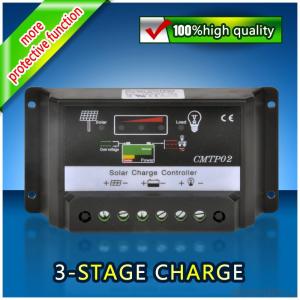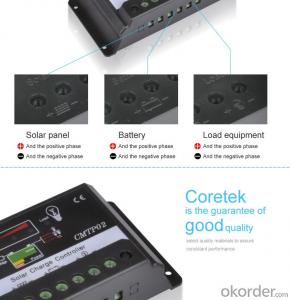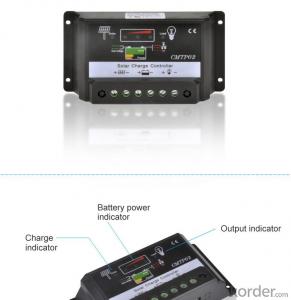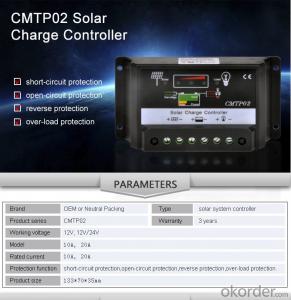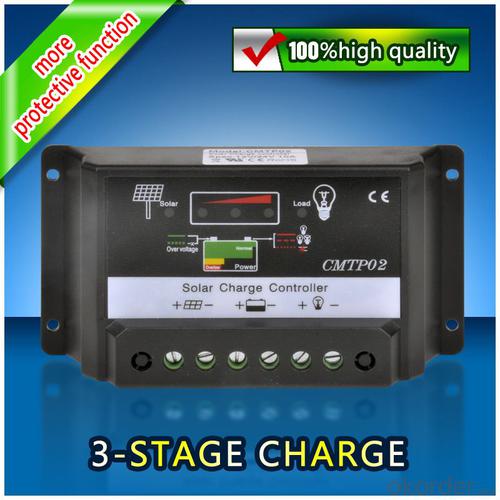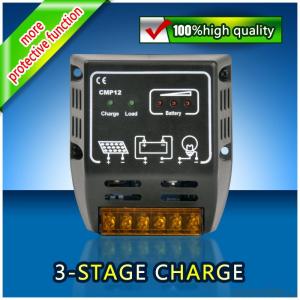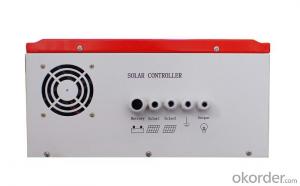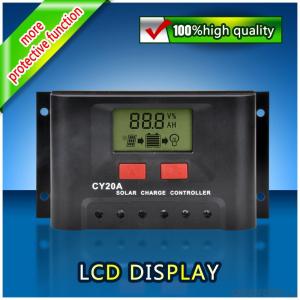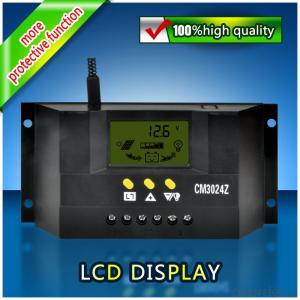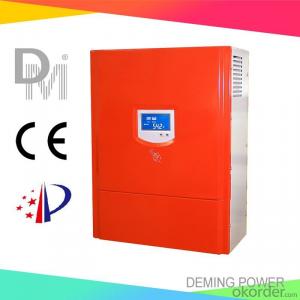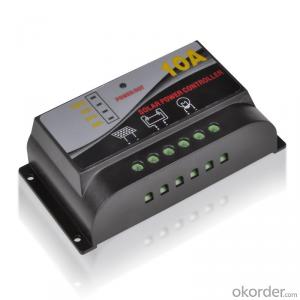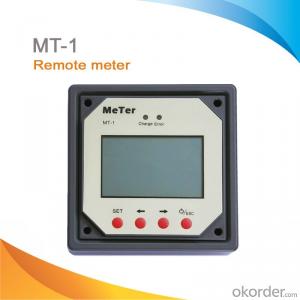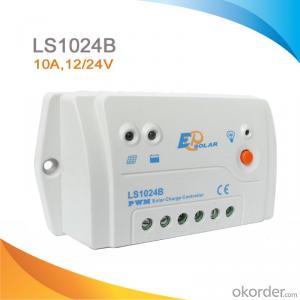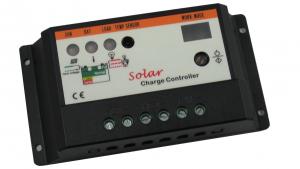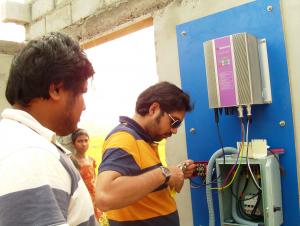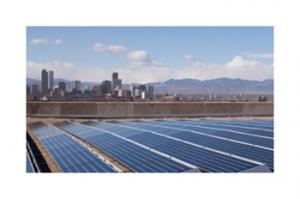Plug-and-play Solar Controller CMTP02 with very good price
- Loading Port:
- China main port
- Payment Terms:
- TT or LC
- Min Order Qty:
- 1 unit
- Supply Capability:
- 10000 unit/month
OKorder Service Pledge
OKorder Financial Service
You Might Also Like
Product Introduction
Solar controller is control device which can control solar panel and transform solar energy into electricity then store to the battery bank. Solar controller is the most important part in offgrid system, whose performance has much effect on life expectancy and operation of the whole system, especially the battery expectancy.
Application Areas
Standalone Photovoltaic power station
Standalone Domestic household photovoltaic power system
Mobil communication base stations, expressway and other non-residential regions.
Coastal islands, remote mountainous, border posts for regions shortage of or without electricity.
Government demonstration projects, landscape lighting project etc.
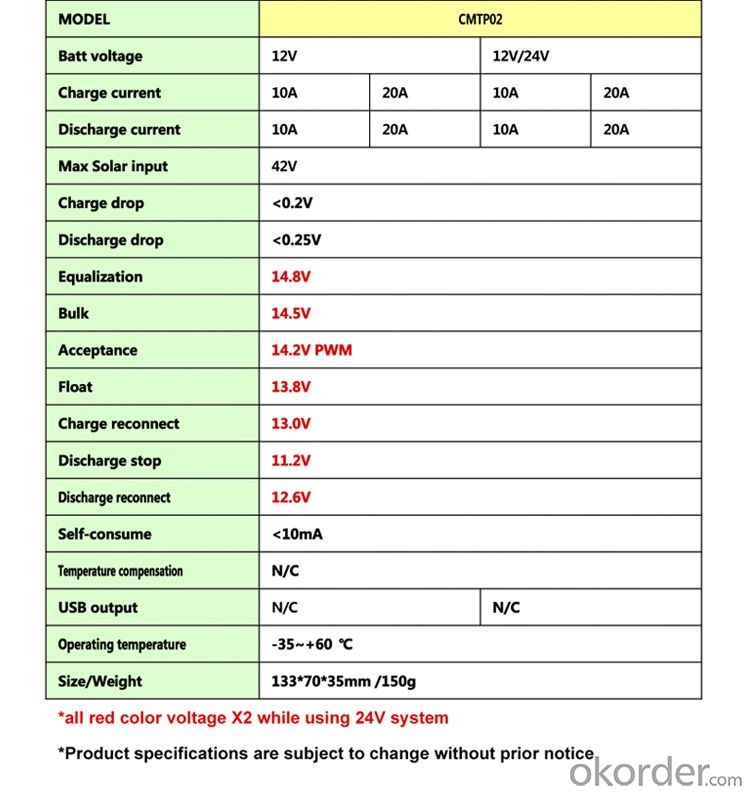
Selection of high-quality materials properties be consistent from beginning to end
For life is a convenient
A little more secure
The innovation design idea of the perfect show
The first set of people-oriented
The high-end configuration components
- Q: Can a solar controller be used for off-grid solar systems?
- Yes, a solar controller can definitely be used for off-grid solar systems. In fact, it is an essential component for managing and regulating the charging and discharging of batteries in off-grid solar setups. The solar controller helps control the flow of electricity from the solar panels to the batteries, ensuring efficient charging and preventing overcharging or damage to the batteries.
- Q: How do I integrate a solar controller with a smart home automation system?
- To integrate a solar controller with a smart home automation system, you need to ensure compatibility between the solar controller and your smart home automation hub or platform. First, check if your solar controller has any built-in communication protocols like Wi-Fi, Zigbee, or Z-Wave. If it does, you can connect it directly to your smart home hub. If not, you may need to use a third-party gateway or bridge that can translate the communication signals from the solar controller to the smart home automation system. Once connected, you can then monitor and control your solar system through your smart home automation app or interface, allowing you to manage energy production, track usage, and automate actions based on solar generation.
- Q: Are there any maintenance requirements for solar controllers?
- Yes, solar controllers typically have minimal maintenance requirements. It is recommended to regularly inspect and clean the solar controller to ensure there are no obstructions or buildup that could affect its performance. Additionally, checking the connections and wiring for any loose or damaged parts is advisable. Overall, solar controllers are designed to be durable and require very little maintenance.
- Q: Can a solar controller be used with a solar-powered electric vehicle charging station?
- Yes, a solar controller can be used with a solar-powered electric vehicle charging station. A solar controller regulates the amount of energy flowing from the solar panels to the charging station, ensuring optimal charging efficiency and protecting the batteries from overcharging.
- Q: How does a solar controller handle the protection against battery reverse polarity?
- A solar controller handles the protection against battery reverse polarity by implementing a built-in mechanism that prevents the flow of current in the wrong direction. This is typically achieved through the use of diodes or MOSFETs that act as one-way valves, allowing only the correct flow of current from the solar panels to the battery. As a result, it safeguards the battery from potential damage caused by reverse polarity.
- Q: How does a solar controller handle the monitoring of system performance?
- A solar controller handles the monitoring of system performance by constantly measuring and analyzing key parameters such as solar panel voltage and current, battery voltage and charge/discharge rates, and load consumption. It tracks these data points in real-time and compares them with predefined thresholds or desired targets. If any deviation or anomaly is detected, the solar controller can take corrective actions, such as adjusting charge/discharge rates, activating alarms, or even shutting down the system to prevent damage. Additionally, some advanced solar controllers can provide detailed performance reports and remote monitoring capabilities, allowing users to assess the system's efficiency and troubleshoot any issues.
- Q: Can a solar controller handle power surges from appliances?
- No, a solar controller is not designed to handle power surges from appliances. Its primary function is to regulate and control the flow of solar power from the solar panels to the battery bank or inverter, ensuring optimum charging and protection of the batteries. Power surge protection is typically handled by surge protectors or surge suppressors, which are separate devices specifically designed for this purpose.
- Q: Can a solar controller be used with solar-powered water pumps?
- Yes, a solar controller can be used with solar-powered water pumps. A solar controller helps regulate the voltage and current from the solar panels to ensure optimal charging and protection of the batteries. It can also control the operation of the pump, allowing it to start and stop based on the available sunlight and water demand.
- Q: What is the maximum number of system data logs supported by a solar controller?
- The maximum number of system data logs supported by a solar controller can vary depending on the specific model and manufacturer. It is recommended to refer to the product's specifications or contact the manufacturer directly to determine the exact number of system data logs supported.
- Q: Can a solar controller handle high temperatures?
- Yes, a solar controller is designed to handle high temperatures. Most solar controllers are built with durable materials and equipped with heat sinks or cooling mechanisms to dissipate heat effectively. They are specifically designed to operate in hot environments without any adverse effects on their performance or longevity.
Send your message to us
Plug-and-play Solar Controller CMTP02 with very good price
- Loading Port:
- China main port
- Payment Terms:
- TT or LC
- Min Order Qty:
- 1 unit
- Supply Capability:
- 10000 unit/month
OKorder Service Pledge
OKorder Financial Service
Similar products
Hot products
Hot Searches
Related keywords
